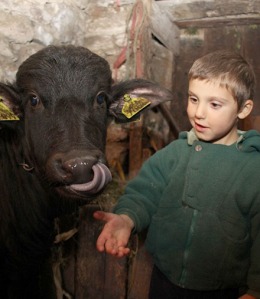This article is part of the “Write For” series, a collection of writings produced by the University of Central Arkansas Department of Writing to highlight incredible organizations that rely on professional writers. To learn more about Professional Writing and the opportunities it offers graduates, click here.
There are a number of professional writers who roll out of bed every workday ready to write good. Right now you’re probably saying, “People do things well – not good,” but you’re not exactly correct. Gandhi, Mother Teresa and Martin Luther King Jr. all devoted their lives to doing good—that is, they actively worked to better the lives of others. In a similar manner, Heifer International’s writers arrive at the nonprofit’s Little Rock headquarters each morning prepared to collaborate with co-workers from all around the world in an effort to eliminate hunger and poverty.
Heifer International is an organization that has truly embraced the concept of teaching a man to fish and feeding him for a lifetime. Since the 1940s, Heifer has reached more than 18.5 million families through its unique agricultural programs.
People in more than 30 countries have received animals—water buffaloes, honeybees and everything in between—and training on how to care for the animals as a result of generous donations from Heifer’s supporters. The animals are gifts that keep giving, because they provide food and marketable goods, and offspring are passed on to other families.
Writers on Heifer International’s Global Communications Team are responsible for telling the remarkable stories that occur every day as the nonprofit works to empower communities worldwide. Lacey West, a 2013 UCA graduate, is currently an intern on the team. She and her fellow communicators use a variety of different tools and skills to share Heifer’s content with the general public as well as the other employees.

Professional writers at Heifer International tell touching stories of impact through “Stories from the Field” blog posts. Click here to read about Vladut, a Romanian boy whose life was changed by the arrival of a Heifer International water buffalo. (Photo credit: Laura Manciu)
Some of West’s responsibilities include editing “Stories from the Field,” project updates from around the globe, and the “Friday Fast Blast,” a weekly email newsletter for Heifer employees. This editorial role requires a strong eye for detail, because some of the organization’s authors are non-native English speakers who aren’t familiar with English grammar. West also ensures writing complies with Heifer International’s writing style, which is learned on the job, and Associated Press style, a set of copy-editing guidelines frequently used by newspapers.
Erin Snow, Global Communications manager, said valuable team members know how to shoot and edit photographs and videos that are then featured on Heifer International’s website and social media profiles. “Everybody is expected to do a little bit of everything,” she said. With that in mind, it wouldn’t hurt to brush up on Adobe’s Premiere Pro (film-editing software) and Photoshop (photo-editing software) before trying to join the team.
It should come as no surprise that an organization with the word “international” in its name values a sense of cultural awareness and respect. Snow said that familiarity with a foreign language is “very valuable” because of the global nature of the Heifer International’s work. She also noted that ethnocentrism, or the mindset that one culture is superior to another, must be “left at the door.”
Having a wanderer’s spirit is also a good sign that you’ll fit in at Heifer International. West said she would strongly encourage students to take advantage of any opportunity to travel and experience other cultures. She said trips to Mexico and Uganda opened her eyes to the levels of poverty that exist outside the U.S., giving her a greater appreciation for Heifer’s work. “Heifer isn’t giving handouts—they’re equipping people,” she said. She added that her travel experiences probably made her a more attractive internship candidate.
In addition to having respect for other ways of life and a well-stamped passport, writers who want to work at Heifer International should also have a set of personality traits that are required for work in a nonprofit atmosphere. West said organizations like Heifer International have rigid operating guidelines to ensure everything is done in an ethical, transparent manner. This sometimes means projects require a great deal of review and scrutiny, so patience is crucial.
West added that a writer should be a “great team player,” because the goal isn’t to further individual careers; it is to work together for the common good. Snow also stressed the importance of teamwork. She said members of the Global Communications Team should be friendly and accommodating, because they must often work alongside “non-communicators,” or co-workers who are unfamiliar with the best ways to convey information and ideas.
If you’re ready to wake up each morning and spend your day writing good–telling heartfelt stories of hope and opportunity that take place around the globe–then you should consider joining a nonprofit organization like Heifer International. As Lacey West and Erin Snow can attest, compassionate professional writers who foster an appreciation for other cultures can do truly incredible work–one meaningful video, blog post or social media update at a time.